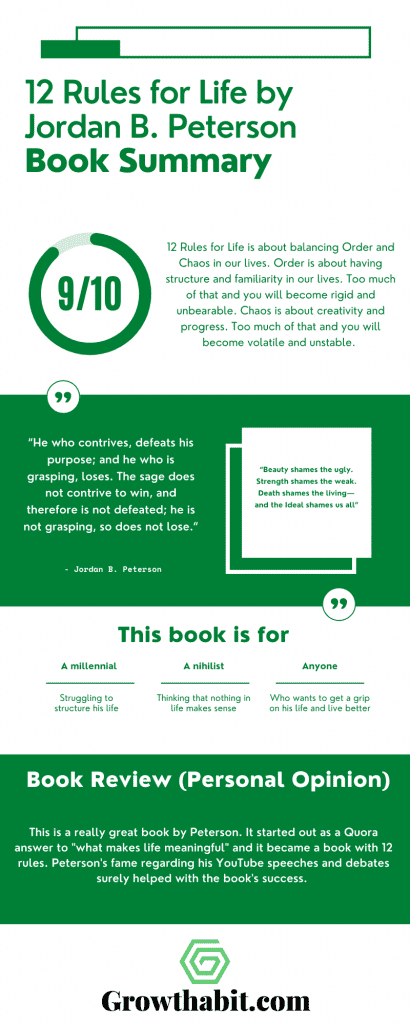12 Rules for Life explains how to walk the thin thread of life that’s situated between Order and Chaos. The 12 rules are what will give you direction so you don’t fall in too much Chaos (or Order). A bestseller that sold more than 3 million copies worldwide.
Book Title: 12 Rules for Life: An Antidote to Chaos
Author: Jordan B. Peterson
Date of Reading: September – October, 2018
Rating: 9/10
What Is Being Said In Detail:
12 Rules for Life is about balancing Order and Chaos in our lives. Order is about having structure and familiarity in our lives. Too much of that and you will become rigid and unbearable. Chaos is about creativity and progress. Too much of that and you will become volatile and unstable.
So the 12 rules will help keep just the right amount of Order and Chaos in your life. They are:
- RULE 1 / Stand up straight with your shoulders back
- RULE 2 / Treat yourself like someone you are responsible for helping
- RULE 3 / Make friends with people who want the best for you
- RULE 4 / Compare yourself to who you were yesterday, not to who someone else is today
- RULE 5 / Do not let your children do anything that makes you dislike them
- RULE 6 / Set your house in perfect order before you criticize the world
- RULE 7 / Pursue what is meaningful (not what is expedient)
- RULE 8 / Tell the truth—or, at least, don’t lie
- RULE 9 / Assume that the person you are listening to might know something you don’t
- RULE 10 / Be precise in your speech
- RULE 11 / Do not bother children when they are skateboarding
- RULE 12 / Pet a cat when you encounter one on the street
Most Important Keywords, Sentences, Quotes:
Foreword by Norman Doidge
“The first idea or teaching is that morality is relative, at best a personal “value judgment.” Relative means that there is no absolute right or wrong in anything; instead, morality and the rules associated with it are just a matter of personal opinion or happenstance, “relative to” or “related to” a particular framework, such as one’s ethnicity, one’s upbringing, or the culture or historical moment one is born into. It’s nothing but an accident of birth. According to this argument (now a creed), history teaches that religions, tribes, nations and ethnic groups tend to disagree about fundamental matters, and always have”
“So, the decent thing to do—once it becomes apparent how arbitrary your, and your society’s, “moral values” are—is to show tolerance for people who think differently, and who come from different (diverse) backgrounds. That emphasis on tolerance is so paramount that for many people one of the worst character flaws a person can have is to be “judgmental.” And, since we don’t know right from wrong, or what is good, just about the most inappropriate thing an adult can do is give a young person advice about how to live.”
So why not call this a book of “guidelines,” a far more relaxed, user-friendly and less rigid sounding term than “rules”? Because these really are rules. And the foremost rule is that you must take responsibility for your own life. Period.”
Overture
“great myths and religious stories of the past, particularly those derived from an earlier, oral tradition, were moral in their intent, rather than descriptive.”
“Order is where the people around you act according to well understood social norms, and remain predictable and cooperative. It’s the world of social structure, explored territory, and familiarity. The state of Order is typically portrayed, symbolically—imaginatively—as masculine. It’s the Wise King and the Tyrant, forever bound together, as society is simultaneously structure and oppression.
Chaos, by contrast, is where—or when—something unexpected happens. Chaos emerges, in trivial form, when you tell a joke at a party with people you think you know and a silent and embarrassing chill falls over the gathering. Chaos is what emerges more catastrophically when you suddenly find yourself without employment, or are betrayed by a lover. As the antithesis of symbolically masculine order, it’s presented imaginatively as feminine.
It’s the new and unpredictable suddenly emerging in the midst of the commonplace familiar. It’s Creation and Destruction, the source of new things and the destination of the dead (as nature, as opposed to culture, is simultaneously birth and demise).”
RULE 1 / Stand up straight with your shoulders back
“When the aristocracy catches a cold, as it is said, the working class dies of pneumonia.”
“When a defeated lobster regains its courage and dares to fight again it is more likely to lose again than you would predict, statistically, from a tally of its previous fights. Its victorious opponent, on the other hand, is more likely to win.”
“The dominant male, with his upright and confident posture, not only gets the prime real estate and easiest access to the best hunting grounds. He also gets all the girls. It is exponentially more worthwhile to be successful, if you are a lobster, and male.”
“It’s chaos, within order, within chaos, within higher order. The order that is most real is the order that is most unchanging— and that is not necessarily the order that is most easily seen. The leaf, when perceived, might blind the observer to the tree. The tree can blind him to the forest. And some things that are most real (such as the ever-present dominance hierarchy) cannot be “seen” at all.”
“If you’re a number one, the highest level of status, you’re an overwhelming success. If you’re male, you have preferential access to the best places to live and the highest-quality food. People compete to do you favours. You have limitless opportunity for romantic and sexual contact. You are a successful lobster, and the most desirable females line up and vie for your attention.”
“Unfortunately, that physical hyper-response, that constant alertness, burns up a lot of precious energy and physical resources. This response is really what everyone calls stress, and it is by no means only or even primarily psychological. It’s a reflection of the genuine constraints of unfortunate circumstances.
When operating at the bottom, the ancient brain counter assumes that even the smallest unexpected impediment might produce an uncontrollable chain of negative events,which will have to be handled alone, as useful friends are rare indeed, on society’s fringes.”
“If you have a high status, on the other hand, the counter’s cold, pre-reptilian mechanics assume that your niche is secure, productive and safe, and that you are well buttressed with social support. It thinks the chance that something will damage you is low and can be safely discounted. Change might be opportunity, instead of disaster.
The serotonin flows plentifully. This renders you confident and calm, standing tall and straight, and much less on constant alert. Because your position is secure, the future is likely to be good for you. It’s worthwhile to think in the long term and plan for a better tomorrow.
You don’t need to grasp impulsively at whatever crumbs come your way, because you can realistically expect good things to remain available. You can delay gratification, without forgoing it forever. You can afford to be a reliable and thoughtful citizen.”
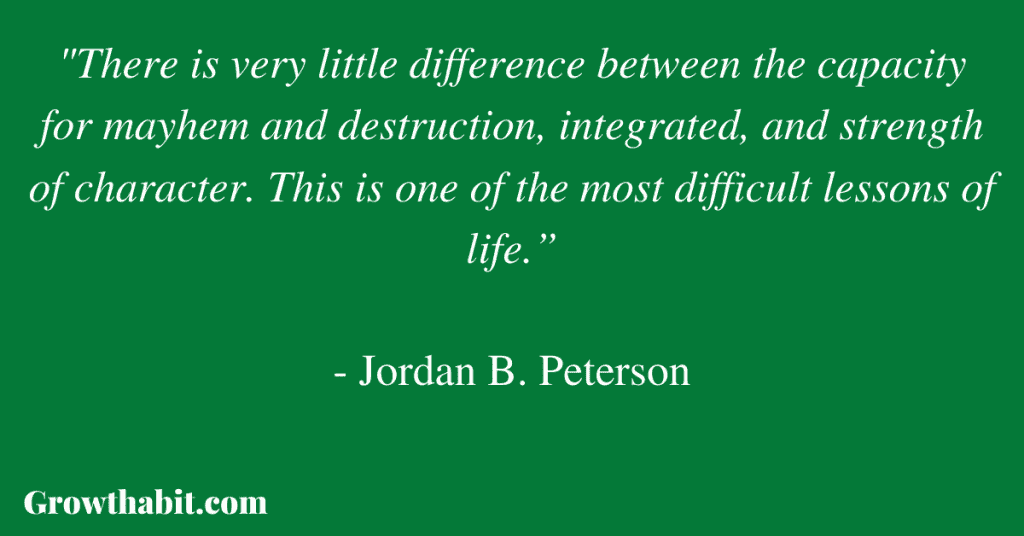
“But just as often, people are bullied because they won’t fight back. This happens not infrequently to people who are by temperament compassionate and self-sacrificing—particularly if they are also high in negative emotion, and make a lot of gratifying noises of suffering when someone sadistic confronts them (children who cry more easily, for example, are more frequently bullied).”
“With their capacity for aggression strait-jacketed within a too-narrow morality, those who are only or merely compassionate and self-sacrificing (and naïve and exploitable) cannot call forth the genuinely righteous and appropriately self-protective anger necessary to defend themselves. If you can bite, you generally don’t have to.”
“To say it again: There is very little difference between the capacity for mayhem and destruction, integrated, and strength of character. This is one of the most difficult lessons of life.”
“Maybe you are a loser. And maybe you’re not—but if you are, you don’t have to continue in that mode.”
“Some of the positive feedback loops instantiated by body language can occur beyond the private confines of subjective experience, in the social space you share with other people. If your posture is poor, for example—if you slump, shoulders forward and rounded, chest tucked in, head down, looking small, defeated and ineffectual (protected, in theory, against attack from behind)—then you will feel small, defeated and ineffectual”
“If you’re in number ten position, then standing up straight and appearing dominant might only attract the attention of those who want, once again, to put you down.”
“attend carefully to your posture. Quit drooping and hunching around. Speak your mind. Put your desires forward, as if you had a right to them—at least the same right as others. Walk tall and gaze forthrightly ahead. Dare to be dangerous. Encourage the serotonin to flow plentifully through the neural pathways desperate for its calming influence.”
RULE 2 / Treat yourself like someone you are responsible for helping
“One of these is chaos. Another is order. The third (as there are three) is the process that mediates between the two, which appears identical to what modern people call consciousness.”
“Before the Twin Towers fell—that was order. Chaos manifested itself afterward. Everyone felt it. The very air became uncertain. What exactly was it that fell? Wrong question. What exactly remained standing? That was the issue at hand.”
“No matter who we are, Kalahari Desert-dweller or Wall Street banker, some things are under our control, and some things are not. That’s why both can understand the same stories, and dwell within the confines of the same eternal truths.”
“As the great Russian writer Aleksandr Solzhenitsyn insisted, the line dividing good and evil cuts through the heart of every human being.”
“Question for parents: do you want to make your children safe, or strong?”
“Beauty shames the ugly. Strength shames the weak. Death shames the living—and the Ideal shames us all”
“Abandon all ideals of beauty, health, brilliance and strength? That’s not a good solution. That would merely ensure that we would feel ashamed, all the time—and that we would even more justly deserve it.”
“Any claim that the Golden Rule does not mean “sacrifice yourself for others” might therefore appear dubious.”
“To sacrifice ourselves to God (to the highest good, if you like) does not mean to suffer silently and willingly when some person or organization demands more from us, consistently, than is offered in return. That means we are supporting tyranny, and allowing ourselves to be treated like slaves. It is not virtuous to be victimized by a bully, even if that bully is oneself.”
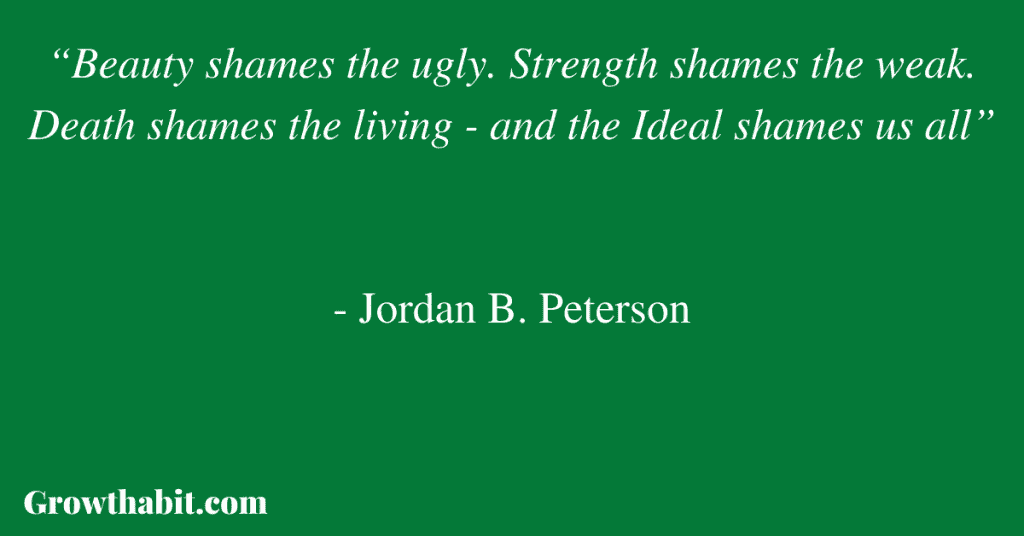
“Carl Jung, the famous Swiss depth psychologist, about “doing unto others as you would have them do unto you” or “loving your neighbour as yourself.” The first lesson was that neither of these statements has anything to do with being nice.
The second was that both are equations, rather than injunctions. If I am someone’s friend, family member, or lover, then I am morally obliged to bargain as hard on my own behalf as they are on theirs. If I fail to do so, I will end up a slave, and the other person a tyrant. What good is that? It is much better for any relationship when both partners are strong.”
“To treat yourself as if you were someone you are responsible for helping is, instead, to consider what would be truly good for you. This is not “what you want.” It is also not “what would make you happy.” Every time you give a child something sweet, you make that child happy.
That does not mean that you should do nothing for children except feed them candy. “Happy” is by no means synonymous with “good.” You must get children to brush their teeth. They must put on their snowsuits when they go outside in the cold, even though they might object strenuously.”
“You need to consider the future and think, “What might my life look like if I were caring for myself properly? What career would challenge me and render me productive and helpful, so that I could shoulder my share of the load, and enjoy the consequences?”
RULE 3 / Make friends with people who want the best for you
Although we had travelled a long distance, we had gone nowhere at all.
“Sometimes, when people have a low opinion of their own worth—or, perhaps, when they refuse responsibility for their lives—they choose a new acquaintance, of precisely the type who proved troublesome in the past.”
“Freud called this a “repetition compulsion.” He thought of it as an unconscious drive to repeat the horrors of the past—sometimes, perhaps, to formulate those horrors more precisely, sometimes to attempt more active mastery and sometimes, perhaps, because no alternatives beckon.”
”It is only right to see the best in people. The highest virtue is the desire to help.” But not everyone who is failing is a victim, and not everyone at the bottom wishes to rise, although many do, and many manage it. Nonetheless, people will often accept or even amplify their own suffering, as well as that of others, if they can brandish it as evidence of the world’s injustice.”
“The same thing happens when well-meaning counsellors place a delinquent teen among comparatively civilized peers. The delinquency spreads, not the stability. Down is a lot easier than up.”
“Besides, if you buy the story that everything terrible just happened on its own, with no personal responsibility on the part of the victim, you deny that person all agency in the past (and, by implication, in the present and future, as well). In this manner, you strip him or her of all power.”
“Success: that’s the mystery. Virtue: that’s what’s inexplicable. To fail, you merely have to cultivate a few bad habits. You just have to bide your time. And once someone has spent enough time cultivating bad habits and biding their time, they are much diminished.
Much of what they could have been has dissipated, and much of the less that they have become is now real. Things fall apart, of their own accord, but the sins of men speed their degeneration. And then comes the flood”
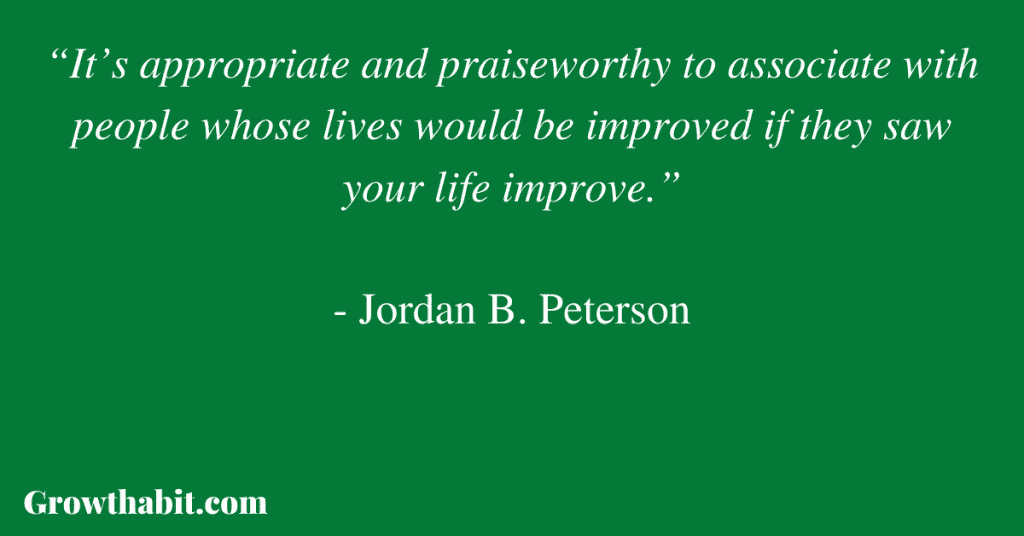
“The desire to improve was, instead, the precondition for progress. I’ve had court-mandated psychotherapy clients. They did not want my help. They were forced to seek it. It did not work. It was a travesty.”
“Maybe I can then conclude, about myself, “Someone that self sacrificing, that willing to help someone—that has to be a good person.” Not so. It might be just a person trying to look good pretending to solve what appears to be a difficult problem instead of actually being good and addressing something real.”
“If you have a friend whose friendship you wouldn’t recommend to your sister, or your father, or your son, why would you have such a friend for yourself?”
“It’s appropriate and praiseworthy to associate with people whose lives would be improved if they saw your life improve.”
“They will instead encourage you when you do good for yourself and others and punish you carefully when you do not.”
“A good, healthy person is an ideal. It requires strength and daring to stand up near such a person. Have some humility. Have some courage. Use your judgment, and protect yourself from too-uncritical compassion and pity.”
RULE 4 / Compare yourself to who you were yesterday, not to who someone else is today
“And you? Your career is boring and pointless, your housekeeping skills are second-rate, your taste is appalling, you’re fatter than your friends, and everyone dreads your parties. Who cares if you are prime minister of Canada when someone else is the president of the United States?”
“The winners don’t take all, but they take most, and the bottom is not a good place to be. People are unhappy at the bottom.”
“Standards of better or worse are not illusory or unnecessary. If you hadn’t decided that what you are doing right now was better than the alternatives, you wouldn’t be doing it.”
“Differentials in quality are omnipresent. Furthermore, if there was no better and worse, nothing would be worth doing. There would be no value and, therefore, no meaning. Why make an effort if it doesn’t improve anything?”
“Who are you? You think you know, but maybe you don’t. You are, for example, neither your own master, nor your own slave. You cannot easily tell yourself what to do and compel your own obedience (any more than you can easily tell your husband, wife, son or daughter what to do, and compel theirs).
You are interested in some things and not in others. You can shape that interest, but there are limits. Some activities will always engage you, and others simply will not.”
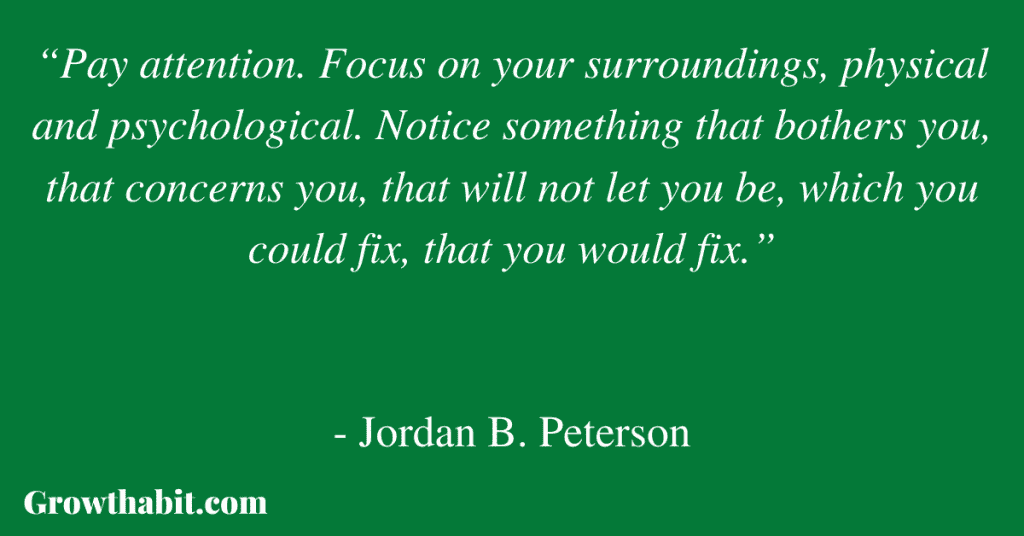
“How much can you sacrifice to your partner before generosity turns to resentment? What is it that you actually love?”
“It’s part of an evil triad: arrogance, deceit, and resentment. Nothing causes more harm than this underworld Trinity.”
“The infant is dependent on his parents for almost everything he needs. The child—the successful child—can leave his parents, at least temporarily, and make friends. He gives up a little of himself to do that, but gains much in return.
The successful adolescent must take that process to its logical conclusion. He has to leave his parents and become like everyone else. He has to integrate with the group so he can transcend his childhood dependency. Once integrated, the successful adult then must learn how to be just the right amount different from everyone else.”
“Aim small. You don’t want to shoulder too much to begin with, given your limited talents, tendency to deceive, burden of resentment, and ability to shirk responsibility.
Thus, you set the following goal: by the end of the day, I want things in my life to be a tiny bit better than they were this morning. Then you ask yourself, “What could I do, that I would do, that would accomplish that, and what small thing would I like as a reward?” Then you do what you have decided to do, even if you do it badly.
Then you give yourself that damn coffee, in triumph. Maybe you feel a bit stupid about it, but you do it anyway. And you do the same thing tomorrow, and the next day, and the next. And, with each day, your baseline of comparison gets a little higher, and that’s magic.”
“You cannot aim yourself at anything if you are completely undisciplined and untutored.”
“It is therefore necessary and desirable for religions to have a dogmatic element. What good is a value system that does not provide a stable structure?”
“Of course, there must be vision, beyond discipline; beyond dogma. A tool still needs a purpose. It is for such reasons that Christ said, in the Gospel of Thomas, “The Kingdom of the Father is spread out upon the earth, but men do not see it.”
“You can only find out what you actually believe (rather than what you think you believe) by watching how you act. You simply don’t know what you believe, before that. You are too complex to understand yourself.”
“The Bible is, for better or worse, the foundational document of Western civilization (of Western values, Western morality, and Western conceptions of good and evil).”
“Pay attention. Focus on your surroundings, physical and psychological. Notice something that bothers you, that concerns you, that will not let you be, which you could fix, that you would fix.”
“Don’t tell yourself, “I shouldn’t need to do that to motivate myself.” What do you know about yourself? You are, on the one hand, the most complex thing in the entire universe, and on the other, someone who can’t even set the clock on your microwave. Don’t overestimate your self knowledge.”
RULE 5 / Do not let your children do anything that makes you dislike them
“ If society is corrupt, but not the individuals within it, then where did the corruption originate? How is it propagated? It’s a one-sided, deeply ideological theory.”
“Each person’s private trouble cannot be solved by a social revolution, because revolutions are destabilizing and dangerous.”
“It has been said that every individual is the conscious or unconscious follower of some influential philosopher. The belief that children have an intrinsically unsullied spirit, damaged only by culture and society, is derived in no small part from the eighteenth-century Genevan French philosopher JeanJacques Rousseau.”
“They want their children’s friendship above all, and are willing to sacrifice respect to get it. This is not good. A child will have many friends, but only two parents—if that—and parents are more, not less, than friends.”
“A patient adult can defeat a two-year-old, hard as that is to believe. As the saying goes: “Old age and treachery can always overcome youth and skill.”
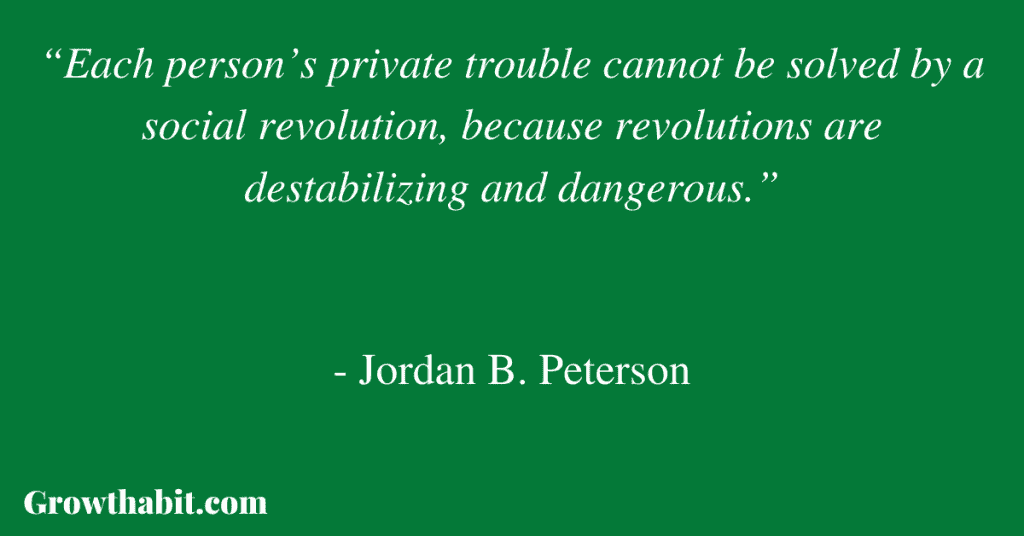
“Given this, the fundamental moral question is not how to shelter children completely from misadventure and failure, so they never experience any fear or pain, but how to maximize their learning so that useful knowledge may be gained with minimal cost.”
“Here’s a straightforward initial idea: rules should not be multiplied beyond necessity. Alternatively stated, bad laws drive out respect for good laws.”
“The first: limit the rules. The second: Use the least force necessary to enforce those rules.”
“What no means, in the final analysis, is always “If you continue to do that, something you do not like will happen to you.” Otherwise it means nothing. Or, worse, it means “another nonsensical nothing muttered by ignorable adults.”
“A child who pays attention, instead of drifting, and can play, and does not whine, and is comical, but not annoying, and is trustworthy—that child will have friends wherever he goes.”
RULE 6 / Set your house in perfect order before you criticize the world
“Distress, whether psychic, physical, or intellectual, need not at all produce nihilism (that is, the radical rejection of value, meaning and desirability). Such distress always permits a variety of interpretations.”
“Someone tormented by her mother can learn from her terrible experiences how important it is to be a good parent. Many, perhaps even most, of the adults who abuse children were abused themselves as children. However, the majority of people who were abused as children do not abuse their own children.”
“The ancient Jews always blamed themselves when things fell apart. They acted as if God’s goodness—the goodness of reality—was axiomatic, and took responsibility for their own failure.”
“If the answer is no, here’s something to try: Start to stop doing what you know to be wrong. Start stopping today.”
RULE 7 / Pursue what is meaningful (not what is expedient)
“Do what’s expedient. Lie, cheat, steal, deceive, manipulate—but don’t get caught. In an ultimately meaningless universe, what possible difference could it make? And this is by no means a new idea. The fact of life’s tragedy and the suffering that is part of it has been used to justify the pursuit of immediate selfish gratification for a very long time.”
“We learned that behaving properly now, in the present—regulating our impulses, considering the plight of others—could bring rewards in the future, in a time and place that did not yet exist.”
“His own becomes key, opening the door to deep understanding of the desert encounter with the devil himself. “Homo sum, humani nihil a me alienum puto,” said the Roman playwright Terence: nothing human is alien to me.”
”No tree can grow to Heaven,” adds the ever-terrifying Carl Gustav Jung, psychoanalyst extraordinaire, “unless its roots reach down to Hell.”
“He who contrives, defeats his purpose; and he who is grasping, loses. The sage does not contrive to win, and therefore is not defeated; he is not grasping, so does not lose.”
“It was in the aftermath of God’s death that the great collective horrors of Communism and Fascism sprang forth (as both Dostoevsky and Nietzsche predicted they would).”
“But this is the element of his thinking that appears weakest, psychologically: we cannot invent our own values, because we cannot merely impose what we believe on our souls.”
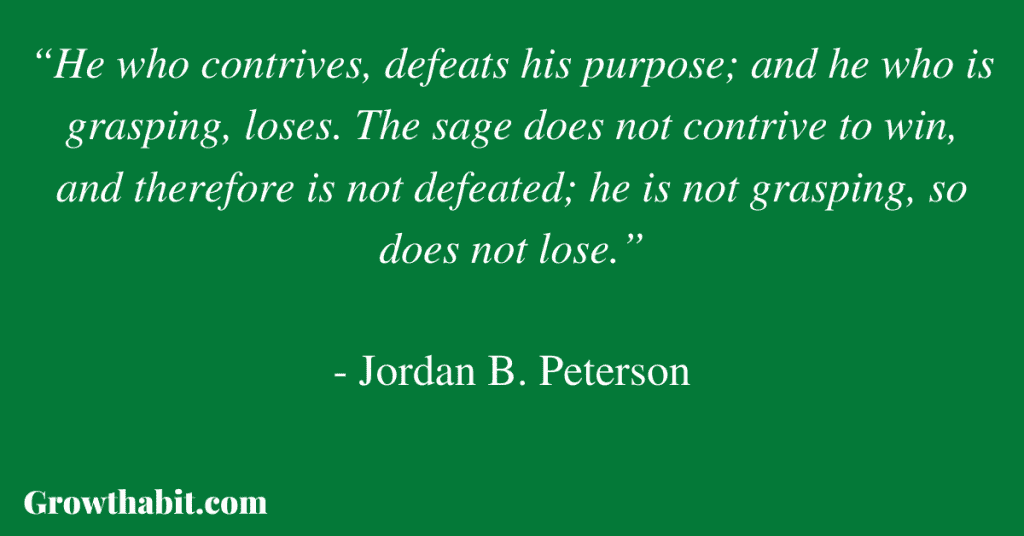
“Socialists were more intrinsically capitalist than the capitalists. They believed just as strongly in money. They just thought that if different people had the money, the problems plaguing humanity would vanish.”
“Jung observed that the construction of such a moral hierarchy was inevitable—although it could remain poorly arranged and internally self-contradictory. For Jung, whatever was at the top of an individual’s moral hierarchy was, for all intents and purposes, that person’s ultimate value, that person’s god. It was what the person acted out. It was what the person believed most deeply.”
“If you act properly, your actions allow you to be psychologically integrated now, and tomorrow, and into the future, while you benefit yourself, your family, and the broader world around you. Everything will stack up and align along a single axis. Everything will come together. This produces maximal meaning.”
“Meaning is when everything there is comes together in an ecstatic dance of single purpose—the glorification of a reality so that no matter how good it has suddenly become, it can get better and better and better more and more deeply forever into the future.”
RULE 8 / Tell the truth—or, at least, don’t lie
“There is another fundamental problem, too, with the life-lie, particularly when it is based on avoidance. A sin of commission occurs when you do something you know to be wrong.
A sin of omission occurs when you let something bad happen when you could do something to stop it. The former is regarded, classically, as more serious than the latter—than avoidance. I’m not so sure.”
“It means that so much of what you could be will never be forced by necessity to come forward.”
“If you say no to your boss, or your spouse, or your mother, when it needs to be said, then you transform yourself into someone who can say no when it needs to be said.
If you ever wonder how perfectly ordinary, decent people could find themselves doing the terrible things the gulag camp guards did, you now have your answer. By the time no seriously needed to be said, there was no one left capable of saying it”
“The prideful, rational mind, comfortable with its certainty, enamoured of its own brilliance, is easily tempted to ignore error, and to sweep dirt under the rug. Literary, existential philosophers, beginning with Søren Kierkegaard, conceived of this mode of Being as “inauthentic.” An inauthentic person continues to perceive and act in ways his own experience has demonstrated false. He does not speak with his own voice.”
“Someone power-hungry makes a new rule at your workplace. It’s unnecessary. It’s counterproductive. It’s an irritant. It removes some of the pleasure and meaning from your work. But you tell yourself it’s all right. It’s not worth complaining about. Then it happens again. You’ve already trained yourself to allow such things, by failing to react the first time.”
“You’re a little less courageous. Your opponent, unopposed, is a little bit stronger. The institution is a little bit more corrupt. The process of bureaucratic stagnation and oppression is underway, and you’ve contributed, by pretending that it was OK. Why not complain? Why not take a stand?”
“It was for this reason that Nietzsche said that a man’s worth was determined by how much truth he could tolerate.”
“You are by no means only what you already know. You are also all that which you could know, if you only would.”
“Sometimes such deaths virtually destroy us.”
“One day you have had enough. You drop out. You disappoint your parents. You learn to live with that. You consult only yourself, even though that means you must rely on your own decisions. You take a philosophy degree. You accept the burden of your own mistakes. You become your own person. By rejecting your father’s vision, you develop your own. And then, as your parents age, you’ve become adult enough to be there for them, when they come to need you.”
RULE 9 / Assume that the person you are listening to might know something you don’t
”Stop the discussion for a moment, and institute this rule: ‘Each person can speak up for himself only after he has first restated the ideas and feelings of the previous speaker accurately, and to that speaker’s satisfaction.’”
“There are several primary advantages to this process of summary. The first advantage is that I genuinely come to understand what the person is saying. Of this, Rogers notes, “Sounds simple, doesn’t it? But if you try it you will discover it is one of the most difficult things you have ever tried to do.
If you really understand a person in this way, if you are willing to enter his private world and see the way life appears to him, you run the risk of being changed yourself. You might see it his way, you might find yourself influenced in your attitudes or personality. This risk of being changed is one of the most frightening prospects most of us can face.”
“The third advantage to employing the Rogerian method is the difficulty it poses to the careless construction of straw-man arguments. When someone opposes you, it is very tempting to oversimplify, parody, or distort his or her position. This is a counterproductive game, designed both to harm the dissenter and to unjustly raise your personal status.”
RULE 10 / Be precise in your speech
“Don’t ever underestimate the destructive power of sins of omission.”
“Here’s the terrible truth about such matters: every single voluntarily unprocessed and uncomprehended and ignored reason for marital failure will compound and conspire and will then plague that betrayed and self-betrayed woman for the rest of her life. The same goes for her husband.”
“This is difficult, but the difficulty is not relevant, because the alternative is worse.”
“You can’t get from point A to point B unless you are already at point A, and if you’re just “anywhere” the chances you are at point A are very small indeed.”
“Confront the chaos of Being. Take aim against a sea of troubles. Specify your destination, and chart your course. Admit to what you want. Tell those around you who you are. Narrow, and gaze attentively, and move forward, forthrightly.”
RULE 11 / Do not bother children when they are skateboarding
“Kids need playgrounds dangerous enough to remain challenging. People, including children (who are people too, after all) don’t seek to minimize risk. They seek to optimize it.”
“He concluded that the tweed-wearing, armchair-philosophizing, victim-identifying, pity and-contempt-dispensing social reformer types frequently did not like the poor, as they claimed. Instead, they just hated the rich.”
“It is because of of Freud, Jung, Nietzsche—and Orwell—that I always wonder, “What, then, do you stand against?” whenever I hear someone say, too loudly, “I stand for this!” The question seems particularly relevant if the same someone is complaining, criticizing, or trying to change someone else’s behaviour”
“Jung who developed the most surgically wicked of psychoanalytic dicta: if you cannot understand why someone did something, look at the consequences—and infer the motivation.”
“People motivated to make things better usually aren’t concerned with changing other people—or, if they are, they take responsibility for making the same changes to themselves (and first).”
“No one in the modern world may without objection express the opinion that existence would be bettered by the absence of Jews, blacks, Muslims, or Englishmen. Why, then, is it virtuous to propose that the planet might be better off, if there were fewer people on it?”
“Boys are suffering, in the modern world. They are more disobedient—negatively—or more independent—positively—than girls, and they suffer for this, throughout their pre university educational career.
They are less agreeable (agreeableness being a personality trait associated with compassion, empathy and avoidance of conflict) and less susceptible to anxiety and depression, at least after both sexes hit puberty. Boys’ interests tilt towards things; girls’ interests tilt towards people.
Strikingly, these differences, strongly influenced by biological factors, are most pronounced in the Scandinavian societies where gender equality has been pushed hardest: this is the opposite of what would be expected by those who insist, ever more loudly, that gender is a social construct. It isn’t. This isn’t a debate.
The data are in games. This is in part because it is admirable for a girl to win when competing with a boy. It is also OK for her to lose to a boy. For a boy to beat a girl, however, it is often not OK—and just as often, it is even less OK for him to lose. Imagine that a boy and a girl, aged nine, get into a fight. Just for engaging, the boy is highly suspect. If he wins, he’s pathetic. If he loses —well, his life might as well be over. Beat up by a girl.”
“First, women have a strong proclivity to marry across or up the economic dominance hierarchy. They prefer a partner of equal or greater status. This holds true cross-culturally. The same does not hold, by the way, for men, who are perfectly willing to marry across or down (as the Pew data indicate),”
“Any hierarchy creates winners and losers. The winners are, of course, more likely to justify the hierarchy and the losers to criticize it. But (1) the collective pursuit of any valued goal produces a hierarchy (as some will be better and some worse at that pursuit not matter what it is) and (2) it is the pursuit of goals that in large part lends life its sustaining meaning.”
“This did not mean that the fascination Marxist ideas had for intellectuals—particularly French intellectuals—disappeared. It merely transformed. Some refused outright to learn. Sartre denounced Solzhenitsyn as a “dangerous element.” Derrida, more subtle, substituted the idea of power for the idea of money, and continued on his merry way.”
“Society was no longer repression of the poor by the rich. It was oppression of everyone by the powerful.”
“There are “males and females” only because members of that more heterogeneous group benefit by excluding the tiny minority of people whose biological sexuality is amorphous. Science only benefits the scientists. Politics only benefits the politicians. In Derrida’s view, hierarchies exist because they gain from oppressing those who are omitted. It is this ill-gotten gain that allows them to flourish.”

“competence, not power, is a prime determiner of status. Competence. Ability. Skill. Not power.”
“Entrepreneurs and artists are higher in openness to experience, another cardinal personality trait, than in conscientiousness.”
“Here’s the fundamental problem: group identity can be fractionated right down to the level of the individual.”
“There are only two major reasons for resentment: being taken advantage of (or allowing yourself to be taken advantage of), or whiny refusal to adopt responsibility and grow up.”
“Men enforce a code of behaviour on each other, when working together. Do your work. Pull your weight. Stay awake and pay attention. Don’t whine or be touchy. Stand up for your friends. Don’t suck up and don’t snitch. Don’t be a slave to stupid rules. Don’t, in the immortal words of Arnold Schwarzenegger, be a girlie man. Don’t be dependent. At all. Ever. Period.”
“That does not mean that every manifestation of daring and courage is criminal.”
“When they quit school, they went to work as rig roughnecks when it was forty bloody degrees below zero. It wasn’t weakness that propelled so many out of the classroom, where a better future arguably awaited. It was strength.”
“If they’re healthy, women don’t want boys. They want men. They want someone to contend with; someone to grapple with. If they’re tough, they want someone tougher. If they’re smart, they want someone smarter.”
“This often makes it hard for tough, smart, attractive women to find mates: there just aren’t that many men around who can outclass them enough to be considered desirable (who are higher, as one research publication put it, in “income, education, self-confidence, intelligence, dominance and social position”
RULE 12 / Pet a cat when you encounter one on the street
“If you are already everything, everywhere, always, there is nowhere to go and nothing to be. Everything that could be already is, and everything that could happen already has.”
“John Byrne successfully rebooted it, rewriting Superman, retaining his biography, but depriving him of many of his new powers. He could no longer lift planets, or shrug off an Hbomb. He also became dependent on the sun for his power, like a reverse vampire.
He gained some reasonable limitations. A superhero who can do anything turns out to be no hero at all. He’s nothing specific, so he’s nothing. He has nothing to strive against, so he can’t be admirable. Being of any reasonable sort appears to require limitation.”
“Perhaps you might start by noticing this: when you love someone, it’s not despite their limitations. It’s because of their limitations.”
Book Review (Personal Opinion):
This is a really great book by Peterson. It started out as a Quora answer to “what makes life meaningful” and it became a book with 12 rules. Peterson’s fame regarding his YouTube speeches and debates surely helped with the book’s success.
Rating: 9/10
This Book Is For (Recommend):
- A millennial struggling to structure his life
- A nihilist thinking that nothing in life makes sense
- Anyone who wants to get a grip on his life and live better
If You Want To Learn More
Here’s Jordan Peterson discussing his book
HowTo Academy
How I’ve Implemented The Ideas From The Book
Peterson has a profound way of expressing your thought in simple and actionable words. So I took the 12 rules and started to implement them in life (in as big as steps as I could). I started talking with my parents in a different way, I started shouldering the responsibility for bettering not only for my life, but for life of people around me, and I stopped comparing my success to other people.
One Small Actionable Step You Can Do
Stand up straight with your shoulders back (literally) and say no to the next thing someone asks of you that you don’t want to do.
